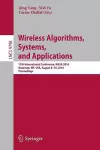
Wireless Algorithms, Systems, and Applications
3 contributors - Paperback
£44.99
Pietro Bartocci graduated in Agricultural Science and Technology at the University of Perugia (Italy) and also has a PhD in Energetics at the Biomass Research Centre, University of Perugia. He has more than 15 years’ experience on biomass and bioenergy sector. He is in the scientific committee of the European Biomass Conference and Exhibition and the International Conference on Biomass. He is visiting professor at HUST University, Wuhan China and assistant professor at the University of Perugia, Italy. He participated to several European projects on biomass and collaborated with SME in product carbon footprinting and LCA analysis. Francesco Fantozzi, MS in Mechanical Engineering at the University of Perugia, PhD in Energy and Aerospace Propulsion at the University of Pisa, is associate professor at the Department of Engineering of the University of Perugia. He is also a member and past chair of the Coal, Biomass and Alternative Fuels Committee of the ASME and senior research expert for the European Union and the Italian government. His research interests focus on micro-scale energy conversion from biomass and waste with pyrolysis, gasification and anaerobic digestion processes, syngas and oils use in gas turbines and engines, monitoring and diagnostics of power plants, and energy and environmental footprinting. He is co-founder of the spin-off company, Biomass and New Technologies (Bionet). Qing Yang’s field of study is focused on energy policy analysis, based on systems accounting for environmental impacts from renewable energies and carbon capture and sequestration (CCS) technologies. She has been involved in the life cycle assessment of nonrenewable energy consumption, pollutant emissions, greenhouse gas emissions from renewable energy derived processes and CCS technologies at global, national, city, plant scales, by using and modifying a range of systems methods-energy analysis, exergy analysis,eMergy analysis, life cycle assessment and ecological footprint. Haiping Yang is a professor in State Key Laboratory of Coal Combustion (SKLCC) at Huazhong University of Science and Technology, China. Her research interests are focused on Biomass pyrolysis/gasification for H2 enriched gas fuel, liquid bio oil and carbon contained materials and chemicals. She also working on the fundamental mechanism exploration of biomass thermochemical conversion process. So far she has published over 100 SCI papers, and 5 were cited in ESI, and the highest SCI cite for 1 paper is over 2000. Now she owns Newton Advanced Fellowships (UK, 2018) and the Chinese Most Cited Researchers (Elsevier, 2014-2018). She gained the National Science Fund for Excellent Young Scholars program in 2016 (China). Ondrej Mašek is a Lecturer in Engineering Assessment of Biochar at the University of Edinburgh. He established and has lead biomass pyrolysis and biochar production research at the UK Biochar Research Centre (UKBRC) at UEdin since its establishment in 2009. Over the past five years his team developed, built and commissioned a unique set of laboratory and pilot-scale facilities for biomass pyrolysis and gasification, representing a total investment of over £500k by the University and private sponsors. Dr. Mašek‘s team has considerable expertise related to modification of char properties by selection of feedstock and production conditions, as well as by using feedstock pre-treatment and char post-treatment. His interests are focused on development of thermochemical conversion processes for biomass valorisation by co-production of solid carbon products and chemicals derived from pyrolysis liquids. To date Dr. Mašek published over 30 journal papers in peer-reviewed journals, and supervised 6 PhD and 17 MSc students. He was awarded his PhD in Materials Science and Engineering from the Hokkaido University (Sapporo, Japan) in 2007. Following his PhD, Dr. Mašek worked for two years as a research officer at the Energy Technology Centre at Cranfield University (UK). During this period he worked on combustion and gasification of biomass, underground coal gasification and CO2 capture technologies. Dr. Mašek commenced his permanent full-time appointment as a Lecturer in Engineering Assessment of Biochar at the School of GeoSciences in April 2009. Haiping Yang is a professor in State Key Laboratory of Coal Combustion (SKLCC) at Huazhong University of Science and Technology, China. Her research interests are focused on Biomass pyrolysis/gasification for H2 enriched gas fuel, liquid bio oil and carbon contained materials and chemicals. She also working on the fundamental mechanism exploration of biomass thermochemical conversion process. So far she has published over 100 SCI papers, and 5 were cited in ESI, and the highest SCI cite for 1 paper is over 2000. Now she owns Newton Advanced Fellowships (UK, 2018) and the Chinese Most Cited Researchers (Elsevier, 2014-2018). She gained the National Science Fund for Excellent Young Scholars program in 2016 (China). Zhen Fang is professor and leader of biomass group, College of Engineering, Nanjing Agricultural University. He is the inventor of the “fast hydrolysis process, the elected fellow of the Canadian Academy of Engineering. Professor Fang specializes in thermal/biochemical conversion of biomass, nanocatalysts synthesis and their applications, pretreatment of biomass for biorefineries, and supercritical fluid processes. He obtained his PhDs from China Agricultural University (Beijing) and McGill University (Montreal). Professor Fang is Associate Editor of the international journals, Biotechnology for Biofuels and Journal of Renewable Materials. He has more than 20-year international research experience at top universities and institutes around the world, including 1 year in Spain (University of Zaragoza), 3 years in Japan (Biomass Technology Research Center, AIST; Tohoku University), and more than 8 years in Canada (McGill) in renewable energy and green technologies. Dr. Rigamonti is involved in LCA (Life Cycle Assessment) of solid wastes treatment processes and technologies, included wastewater treatment plants. She also deals with waste prevention practices at the consumer level. Analysis of atmospheric pollution and GHG emissions is performed also focusing on CCS technologies as remediation techniques. Rigamonti is member of the Italian Network of LCA, where she coordinates the group “Development and Improvement of LCA methodology: Research and Exchange of experiences and the group on “Waste management and treatment.